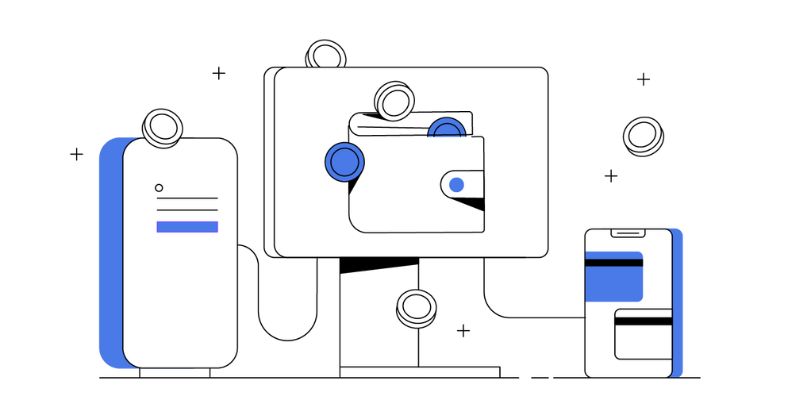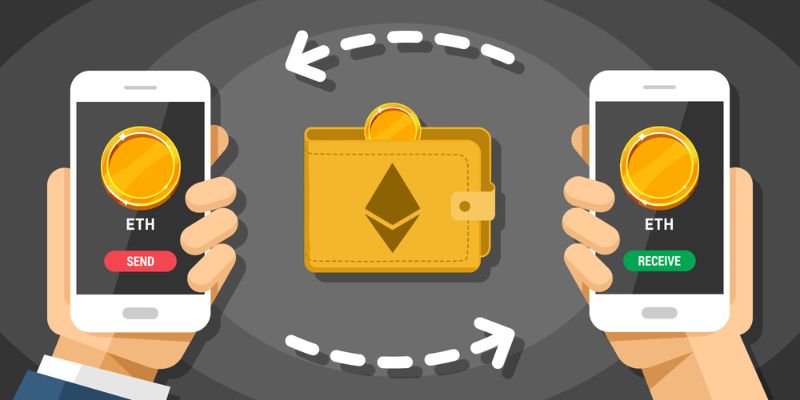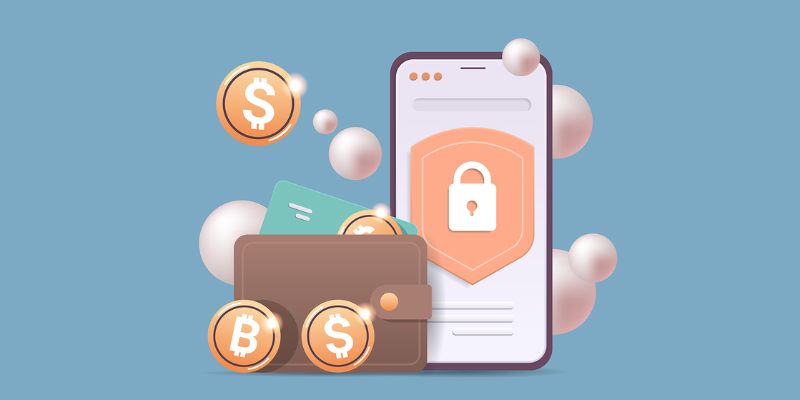Mobile Crypto Wallet vs Desktop Wallet: Which Secures Your Coins Better? Deciding can be tough. Both store crypto, but they’re not the same. Your phone is easy to grab, always with you. But is it safe enough for your digital gold? On the flip side, your desktop might feel like Fort Knox, but can you count on it in a pinch? We’ll dive deep into what makes each tick, the security they bring to the table, and which might be the best vault for your virtual valuables. Let’s find out if mobile is mightier or if desktop defends your digital dollars better.
Understanding Mobile and Desktop Wallet Security
Mobile Wallet Security Features
Let’s talk about keeping your coins safe on the go. Mobile wallets turn your phone into a pocket-sized vault. They do a good job, but we need to dig into the fine print. They protect your crypto with cool features like fingerprint scans. But, there’s more.
Mobile wallets encrypt your info. This means they turn your sensitive data into secret codes. Even if bad guys get your phone, they can’t read your data without the key. But can they still crack it? Well, it’s tough, but not impossible. Hackers are super clever, so you’ve got to stay one step ahead.
Now, what if you lose your phone? It happens, right? Good news – mobile wallets have backup methods. You can recover your funds if you’ve got your backup info. So, remember to back up your wallet and keep that info safe somewhere else.
But it’s not all perfect. Mobile wallets, as handy as they are, face some risks. They’re always online, which makes them hot targets for hackers. This is like always keeping your door open. It’s convenient to come and go, but it also means unwelcome guests might pop in.
Desktop Wallet Security Enhancements
Let’s switch gears to desktop wallets. These are like a safe in your home office. They’re more secure, partly because your desktop isn’t always online. They keep your crypto offline, mostly, in what’s called ‘cold storage’. This is safer because hackers can’t reach it without internet.
Desktop wallets come with strong encryption methods. Think of it as a super tough lock on that safe. They make your secret keys into a puzzle that’s really hard to solve. But remember, you must keep your computer safe from viruses and malware. Otherwise, that lock won’t mean much.
Another plus is the network compatibility. Desktop wallets play well with different networks. This is key for managing lots of different coins. They also let you stake your coins right from your computer. This can earn you rewards, just like interest in a savings account.
Storing your seed phrase safely is also easier with a desktop. Seed phrases are like a master password. If you lose everything else, the seed phrase can bring your wallet back. So, on a desktop, you can store it offline, far from hacker’s reaches.
Which is better, mobile or desktop? It depends on how you use your crypto. If you’re always out and making payments, you might lean towards mobile. But for big amounts or if you’re holding long-term, desktop could be safer. Always weigh the convenience against risks. Stay smart about your choices, and you can keep your digital treasures safe, whichever way you go.

Examining Wallet Usability and Access
Mobile Wallet Convenience for Users
Smartphones rule our lives. They also hold our digital cash. With mobile wallets, your crypto rides with you. Paying for stuff with crypto is a breeze when you use your phone. Your digital coins are just a tap away.
“Why is a mobile wallet convenient?” you ask. Think about it. You’ve got your phone on you, right? Almost always. Having your crypto wallet on that device means you can send and receive funds on the move. No more waiting to get to your laptop.
Remember this: mobile wallets are super handy. With NFC and QR codes, paying is almost too easy. Lost in a new city? Tap your phone, and boom, you’ve paid in crypto. It’s that simple. This isn’t just about ease; it’s about living in a fast-paced world. And your mobile wallet keeps up.
But mobile wallet security is something you can’t ignore. We carry our phones everywhere, and that’s risky. Cracked screens can become cracked security. Plus, mobile wallets face threats like bad apps or hackers over Wi-Fi. So while the convenience is unmatched, you’ve got to stay safe.
Accessibility in Desktop Wallet User Experience
Now, think of your cipher box, your desktop. It’s where power meets stability in crypto storage. Odds are, you won’t tote it to the store, but it’s a fortress for your coins at home. Desktop wallets shine with top-grade security.
Desktop wallets are ace for long-term storage. They’re like the steel safe in your digital bank. With robust encryption methods, they lock away your virtual cash. For those who pile up coins and prefer calm over constant access, desktops work great.
“But are desktop wallets easy to use?” they question. Yes, here’s the scoop: the space on a computer screen makes for easy reading. Comparing big numbers? Eyeing complex charts? It’s all clearer. Plus, with more room comes better control over your crypto stash.
Bear in mind, desktop wallets have their shields up, always. They come with layers of security piled high. The big plus? Fewer worries about device theft and far less exposure to nasty viruses.
Desktop staking? No sweat. With a steady internet link, you’re set. You can help the network and earn rewards, all while keeping your coins safe.
Remember, desktop wallets need updates too. That keeps out the digital creepy-crawlies that lurk in the shadows, waiting to snatch your coins.
In a nutshell, if you’re a home-based crypto warrior, favoring comfort and shielded storage, then desktop’s your ally. Its accessibility is a pillar of strength in the wild west of crypto.
So, mobile or desktop? Your lifestyle holds the key. If you’re always on your feet, craving quick swipes and taps, grab a mobile wallet. For the homebodies, looking to hunker down with stronger walls, the desktop wallet’s your knight. It’s all about how you roll with your cryptos. Choose what fits, and always, keep those coins safe.

Advanced Technologies in Crypto Wallets
Integration of QR Code and NFC in Mobile Wallets
Using mobile wallets? You’ve seen QR codes. They’re everywhere! You scan one, and zap! The crypto address is in. No need to type long strings of random letters and numbers. Makes sending and receiving funds speedy and simple. This, my friends, is mobile wallet convenience at its best.
But it’s not just QR codes; Near Field Communication (NFC) tech lets you pay with a tap. Your phone just needs to be close to another device. Think shopping with crypto – just tap and go. Safe, quick, and you’re done before you know it!
Mobile wallet backup methods? Most have simple options. Write down a seed phrase or use cloud services. This way, you can restore your wallet if your phone takes a dive. Though safe, always think before you sync. Make sure your backup is as secure as your phone.
Let’s talk about mobile wallet vulnerabilities. Our phones are always with us. Good for convenience, but high risk if lost or stolen. Think like a thief – if they get your phone, could they get your coins?
That’s why you must use all security features. Fingerprint locks, face ID, or a strong PIN can protect your wallet. Multi-factor authentication? Always turn it on. It’s like having a guard dog for your digital cash.
Encryption and Backup Methods in Desktop Wallets
Desktop wallets bring a lot to the table. High on that list: encryption methods. They transform your wallet data into a secret code. Imagine your crypto locked in a safe. Encryption is that safe’s thick, steel door.
They often have complex backup options, too. You might back up to a hard drive or a piece of paper locked away in a safe place. If your computer crashes, your digital dollars stay secure.
Desktop wallets are like fortresses for your funds. They are less likely to be stolen physically. But here’s the twist – cyber threats are real. Phishing, malware, you name it. That’s why desktop wallets often update software. Like a wall that gets taller each time a threat comes near.
Using desktop wallets on public Wi-Fi? Think twice. Use secure networks to keep hackers away. Your home Wi-Fi with a strong password is your friend.
Talking about desktop wallet security features, they pack a punch. Picture this – you need several keys to open different locks, one after the other, just to access your stash. That’s what it’s like. And it’s not just for show. It’s to make sure no one gets in without your green light.
Multi-currency wallet support? Desktops have you covered. Imagine having separate folders for each type of coin all in one place. It’s neat, organized, and easy to manage.
A desktop wallet’s user experience has its perks. Big screens make it easier to see all the transaction details. No squinting or zooming in like on a phone. It’s all there, clear as day.
In the end, whether it’s mobile wallets zipping transactions with QR codes and NFC, or desktop powerhouses with ironclad encryption, both have their own way of keeping your coins snug as a bug. Choose what fits your life. After all, it’s your crypto journey.

Best Practices for Managing Crypto Assets
Effective Strategies for Multi-Currency Wallet Support
Keeping your coins safe means knowing how to manage them. With different coins, you need a wallet that can handle them all. I’ve studied this a lot. So, let me tell you about multi-currency wallets. These wallets support many kinds of coins in one spot. This is key if you don’t want to juggle many wallets for each currency.
Now, let’s get real simple. Imagine having a magic purse. This purse holds all kinds of money, not just dollars. In crypto, this is what we’re going for. You want one place for everything. It should be easy to switch between your Bitcoin or Ethereum without a headache.
Smartphone wallets make this simple. They let you switch fast and on the go. Yet, they might be at risk if your phone gets lost or hacked. Desktop wallets are a bit different. They offer more security often but can be harder to access everywhere. Each has its pros and cons.
The best move is keeping your main stash in a desktop wallet. This way, your big funds are safer. Then, put what you need for daily spends in your mobile wallet. This combo keeps you safe and flexible.
Wallet Recovery and Seed Phrase Safeguarding
What if you forget your wallet password? That’s where the seed phrase comes in. Think of it like a master key. If you lose your password, the seed phrase gets you back in.
Yet, it’s super important to keep this safe. If someone gets it, they can open your wallet. So, where do you keep it? Write it down on paper. And please, keep it away from the internet and prying eyes. This means no photos, no digital files – paper only.
For safekeeping, think like a squirrel hiding nuts. Split your seed phrase. Keep parts in different places. Maybe one in a safe at home, one in a bank vault. Hard to find, harder to lose everything.
Both mobile and desktop wallets need this care. Mobile wallets carry higher risk since they’re with you all day. But even on a desktop, a virus or hacker can strike. It’s good to have a backup plan. A hardware wallet, which is offline, can be that safe. It’s cold storage – no net, no hacker worries.
To sum up, mix it up with wallets. Use mobile for daily stuff, desktop for the big savings. Keep that seed phrase safe, offline and split up. This way, you stay ready for anything. Always be one step ahead, and your crypto journey will be smooth sailing.
We’ve covered a lot in this post – from mobile and desktop wallet security to the right ways to handle your crypto. You’ve seen how mobile wallets pack strong safety features and are easy to use on the go. Desktop wallets give you solid security upgrades and reliable access. Both types get a boost from cool tech like QR codes, NFC, and tight encryption.
Remember, keeping your digital coins safe is not just about the wallet you choose. It’s about how you manage your assets. Use smart strategies for your multi-currency support and always protect your wallet recovery details. Security and simplicity matter, so find a balance that feels right for you. With these tips, you’re on your way to being a pro at protecting and enjoying your crypto journey. Stay safe and savvy out there!
Q&A :
What are the main differences between mobile crypto wallets and desktop wallets?
Mobile crypto wallets are applications that run on your smartphone, offering accessibility and convenience, allowing you to manage cryptocurrencies on the go. On the other hand, desktop wallets are software programs that you download and install on your personal computer. They tend to have enhanced security features and offer more robust options for managing your digital assets.
Is a mobile crypto wallet more secure than a desktop wallet?
Security can vary widely between specific wallet applications, whether mobile or desktop. Generally, mobile wallets can be considered less secure if the mobile device is compromised, as they are often connected to the internet. However, both can offer strong security measures such as two-factor authentication and multi-signature support. It’s important to research and choose a wallet with strong security features.
Can I use the same crypto wallet on both mobile and desktop?
Some crypto wallets offer cross-platform compatibility, allowing you to access your funds from both mobile and desktop devices through the same account. However, this may not be the case for all wallets, and it is essential to verify whether the wallet you’re interested in provides this feature before setting it up.
Which is more user-friendly, mobile crypto wallets or desktop wallets?
Mobile crypto wallets tend to be more user-friendly given their simplified interfaces designed for smaller screens and touch navigation. They are ideal for everyday transactions and quick access. Desktop wallets may offer a wider range of features, which can be more suitable for advanced users looking for detailed transaction management and additional capabilities.
How do I choose between a mobile crypto wallet and a desktop wallet?
The choice between a mobile and a desktop crypto wallet depends on your personal needs and lifestyle. If you prioritize convenience and need to access your cryptocurrency while on the move, a mobile wallet might be your best choice. If you require advanced features, enhanced security, or you handle large amounts of cryptocurrencies, a desktop wallet might be more suitable. It is crucial to assess your security needs, the reputation of the wallet, and the features it offers before making a decision.


